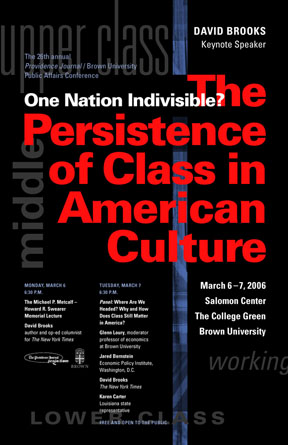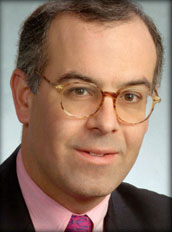 |
Office of Media Relations | |||
News | ||||
|
Providence Journal/Brown Public Affairs Conference
One Nation Indivisible? Experts to Discuss Persistence of Class in America
Some of the nation’s leading voices on class issues in America will gather at Brown University on March 6 and 7, 2006, for the 26th annual Providence Journal/Brown University Public Affairs Conference, titled “One Nation Indivisible? The Persistence of Class in American Culture.” Author and The New York Times columnist David Brooks will deliver the keynote address, the Michael P. Metcalf–Howard R. Swearer Memorial Lecture. All events are free and open to the public. PROVIDENCE, R.I. —David Brooks, author and op-ed columnist for The New York Times, will deliver the keynote address to open the 26th annual Providence Journal/Brown University Public Affairs Conference. The two-day event, titled “One Nation Indivisible? The Persistence of Class in American Culture,” will be held on March 6 and 7, 2006. 
The conference includes two events: the keynote address on Monday, March 6, and a panel discussion on Tuesday, March 7. The keynote address is the Michael P. Metcalf–Howard R. Swearer Memorial Lecture, honoring the legacies of the conference founders, Michael P. Metcalf, chairman and publisher of the Providence Journal Co., and Howard R. Swearer, Brown University’s 15th president. Both sessions begin at 6:30 p.m. in the Salomon Center for Teaching, located on The College Green at Brown University. They are free and open to the public. The Topic This year’s conference considers a timely issue that is of growing concern to many citizens. America has always considered itself an egalitarian society where individual freedom and initiative are the keys to success. Americans have always believed they can rise from rags to riches through hard work and a bit of luck, unencumbered by a rigid tradition of social class. Increasingly, however, the nation appears to be a land of class-based contrasts, where good health care, affordable housing, good K-12 schools, and access to the world’s most elite universities are out of reach for many. The gap between rich and poor has widened substantially in the last two decades – and continues widening at an accelerating pace. “We hope to address the phenomenon of class in America – how it can be identified, how it works, why it persists, what it means for the long-term development of our society,” said Michael Chapman, vice president for public affairs and University relations at Brown. “We also want to explore whether the pernicious effects of class can be understood independently of race, ethnicity and other issues that trouble American society and often cloud our public discourse.” Keynote Speaker: David Brooks 
A bi-weekly op-ed columnist for The New York Times since September 2003, David Brooks frequently writes about politics and modern American culture. He served as a senior editor at The Weekly Standard, a contributing editor at Newsweek and the Atlantic Monthly, and is a commentator on “The Newshour with Jim Lehrer.” He is also a frequent analyst on NPR’s “All Things Considered.” In 2000, Brooks authored Bobos in Paradise: The New Upper Class and How They Got There about the convergence of bohemian and bourgeois cultures, and he most recently published On Paradise Drive: How We Live Now (And Always Have) in Future Tense, investigating suburban life in America. Brooks began his career as a wire reporter in New York City and joined The Washington Times in 1984 as a writer of editorials and film review. Two years later, he became an editor and foreign correspondent for The Wall Street Journal. Brooks is also the editor of the 1996 anthology Backward and Upward: The New Conservative Writing. The Panel Discussion The conference continues on Tuesday, March 7, with a panel examining the questions “Where Are We Headed? Why and How Does Class Still Matter in America?” Panelists are:
Providence Journal/Brown University Public Affairs Conference The Providence Journal/Brown University Public Affairs Conference was originally conceived as a single lecture to celebrate the 150th anniversary of the Journal in 1980. At their first meeting, however, the conference founders – Michael P. Metcalf, chairman and publisher of the Providence Journal Co., and Howard R. Swearer, 15th president of Brown University – immediately expanded the original lecture idea to a three-day symposium featuring national experts. Over the years, the conference has contributed significantly to public discourse in Providence and Rhode Island by presenting distinguished and informed commentators on issues of public concern. Recent conferences have considered Democracy in the Middle East: Is it Possible? (2005); Homeland Insecurity: The Changing Face of Immigration (2004); The City: No Limits (2002); and The Dignity of Children (2001). ###### Media Relations Home | Top of File | e-Subscribe | Brown Home Page | ||||